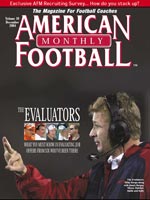AMERICAN FOOTBALL MONTHLY THE #1 RESOURCE FOR FOOTBALL COACHES
Article CategoriesAFM Magazine
|
Getting the Most Out of a Football ClinicSome tips and guidance when thinking about attending the next clinicby: Steve Silverman © More from this issue Itís been a good but not great season. A 6-4 record was good enough to finish in second place in the division, but not good enough to earn a spot in the postseason playoffs. The year has been strangely similar to last year and the year before. It seems that a rut has developed and your team is stuck in it. Thatís not all bad since there has been a lot of winning - but not enough to grab the glory. Itís time to get out of that groove. How does a team get better? How does a coach add to his skill level so his team can be more productive? One of the ways is by going to coaching clinics. Taking classes ....The full article can only be seen by subscribers. Subscribe today!
|
|
|||||||
| HOME |
MAGAZINE |
SUBSCRIBE | ONLINE COLUMNISTS | COACHING VIDEOS |
Copyright 2025, AmericanFootballMonthly.com
All Rights Reserved





